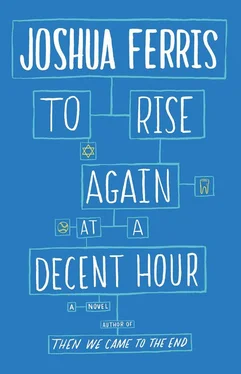I once confided in Connie my fantasy of playing the banjo on the subway and singing along. I’d never told anyone that. I also told her that if she found me doing it, she would know that I was either (1) a changed man or (2) an entirely different person altogether. But to change so much that, with all my inhibitions and musical insecurities, I’d sit down with the banjo on the F train and start singing “San Antonio Rose”—no, that sort of change would render me unrecognizable to myself, so I would necessarily have to be an entirely different person, meaning I would have to suffer a blow to the head and return from the tunnel of beckoning light with better odds and a bigger heart. For me to sing on the subway, I told her, as much as I wanted to, was impossible, because forever standing between me and my singing on the subway was the essential, reluctant, ineradicable, inhibited core of me. “But don’t you believe in the possibility of change? Of self-improvement?” she asked. And I told her what I believed: that genuine self-improvement, actual fundamental change, was exceedingly rare — was, in fact, more like a myth in line with that of a divine Creator. We are who we are, for better or worse, with the exception of a few uncharacteristic gestures and sudden moments of vulnerability. This I did not tell her: if I could have summoned the courage to sing on the subway, I could have also confessed to Uncle Stuart that I loved him, him and all his brothers and all the Plotzes, and vowed never to fail or disappoint them.
My favorite children’s book is called Doctor De Soto, by William Steig. Dr. De Soto is a mouse dentist who will fix the mouth of any animal who doesn’t eat mice. It says so right on the sign hanging outside his shop: CATS & OTHER DANGEROUS ANIMALS NOT ACCEPTED FOR TREATMENT. It’s a reasonable policy. (It has led me to wonder if I have ever done work on the mouth of a murderer.) One day a fox shows up outside Dr. De Soto’s office, weeping with pain. Hippocratically bound and inherently kind, Dr. De Soto is predisposed to help the fox, and his wife, who works as his assistant, encourages him to take pity on the poor beast. So Dr. De Soto, the brave hero dentist, climbs into the fox’s mouth and finds a rotten bicuspid and unusually bad breath. (This is how you know that Steig wasn’t a dentist: it’s all unusually bad.) The fox is grateful to Dr. De Soto. Yet even knowing that his redeemer is in his mouth at that very moment working to remedy the pain, the fox itches to eat the tasty little morsel. Dr. De Soto puts the fox under to extract the tooth, and the fox, laying bare his irrepressible nature, drunkenly mutters how he best likes his mice prepared. That night, Dr. De Soto has his misgivings about the next day’s follow-up. A fox is a fox is a fox. However, he must go through with it. Once he starts a job, he always finishes it. His father, he says, was the same way. (My father, too: he’d start to redo the bathroom grout or lay new linoleum in the kitchen with any other man’s new-project gusto, and when it was exactly one-third complete he’d leave, drive some distance, sell the car for a low figure, and walk home and hand the money to my mother, weeping.) I won’t spoil the ending for you, but needless to say, a fox is a fox is a fox. The foremost heroism on display in Doctor De Soto isn’t the mouse’s noble determination to help despite the mortal dangers all around but the touching suggestion, briefly entertained, that the fox might have an innate capacity to change.
When I was filling a cavity or doing a root canal or extracting a tooth that was beyond repair, I’d think, This could have been prevented. I’d fall back on my old cynical view of human nature: they don’t brush, they don’t floss, they don’t care. A fox is a fox is a fox. But when they did brush and floss and still lost a tooth, I had to blame something else, and just as predictably, I’d point the finger at cruel nature or an indifferent God. I was always saying bad oral health was entirely in their control, unless I was saying that it was entirely out of their control. Then one day I had a patient come in, lived around the corner in one of the few remaining low-income housing complexes on the Upper East Side, worked construction, his hands the hands of a blind strangler, no effort beforehand to remove the chewing tobacco encrevassed between his teeth, and while I was at work on a little local train wreck in the upper-left quadrant, I let my mind wander. This guy probably had poor genes, ignorant parents, a mean childhood. He was never going to take care of his teeth. He never stood a chance of taking care of them. He was going to neglect them until they fell out or he died. Unless by some miracle, he got up from the chair and changed his life. Unless some store of character revealed itself, and with a little guidance from me, he returned in six months a new man. But even then, I thought, that change, that character, would have to be in him already. I was never going to manufacture it with a few stern warnings — God knows I’d tried — and pain forgets within the hour what it learns in an instant. The man in the chair was lord over his best impulses no more than he was king of his worst instincts. Change or no change, his fate was out of his hands. The only question that ever remained was: are you a fox, or something better?
“Dear Paul,” he wrote.
I’m sorry you’re so upset. There’s so much you have yet to grasp. We have nothing against the Jews. Anti-Semitic? No. When in our history would we have had the freedom to pursue hate of any kind? No one in history is more qualified to identify with the Jews and their considerable tragedies than the Ulms. We aren’t the Jew’s enemy, Paul. We are the Jew’s Jew.
The Jew’s Jew? What is that?
Do you know of the escépticos driven into hiding by Alfonso the Wise? Has the Lodz Massacre been brought to your attention? Have the Ulm! Ulm! Riots of 1861 been discussed in your history classes? Has the execution, by British forces, of all Ulms living in Israel, to inaugurate the Jewish state in accordance with the United Nations Partition Plan for Palestine, been so much as a faint shadow in your most distant dream? Do you know how close we are and ever have been to extinction? Say what you will about the tragedies of the Jews. At least they have been documented.
The next morning, I was working on a patient while thinking about a headline in one of the celebrity magazines. It was actually more like a subheadline, which read, in response to Rylie’s announcement that she was pregnant with twins, “Rylie has always wanted to have two babies at once.” They had interviewed Rylie (“Exclusive!”), who confessed that for as long as she could remember, she had always wanted to have two babies at once. Not just one, and not two at different times, but two at once, boom boom . Even when she was three, when she was seven, and then when she was ten, Rylie had wanted to have two babies at one time. It was a childhood dream that kept persisting even as she turned sixteen, twenty, twenty-five, and now, believe it or not, she was pregnant with twins. At last Rylie’s dream was coming true, having two babies at once at last. And how better to share that dream come true with the world than on the cover of a celebrity magazine, under the larger headline “Twins!”
I was thinking about Rylie and her twins and the subheadline announcing the fulfillment of her lifelong dream when Connie appeared in the doorway. I pretended not to see her.
“Dr. O’Rourke?”
I pretended not to hear her.
“Dr. O’Rourke, when you get a minute,” she said.
“Okay, Mr. Shearcliff,” I said, after dithering in Mr. Shearcliff’s mouth a little longer and finding nothing to detain me. “You can sit up and spit now.”
Читать дальше












